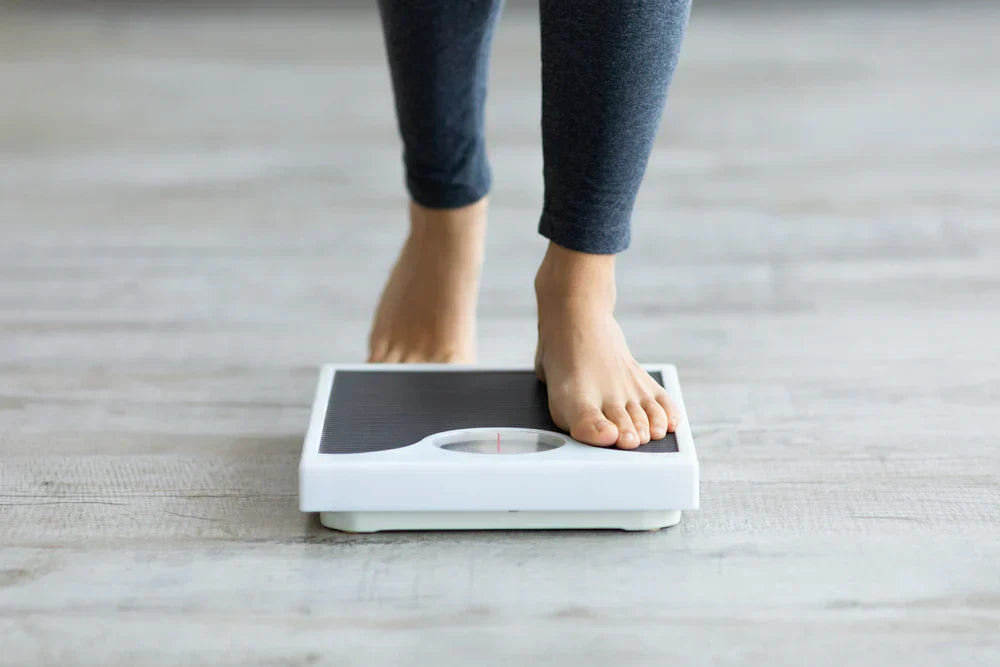Losing weight can help you feel more energized and reduce the risk of health conditions like hypertension, type 2 diabetes, and heart disease. There’s a lot of discussion surrounding weight loss, but a lot of the fad diets you’re hearing about aren’t sustainable. If you want to lose weight safely and be able to sustain that weight loss, you need to make gradual and permanent lifestyle changes to benefit your weight and overall health. Try out the following tips on how to lose weight successfully and sustainably.
1. Eat a Variety of Nutrient-Rich Foods

It’s no secret that diet is a large part of how to lose weight. Crash dieting and cutting out food groups are popular fad diets, but they aren’t sustainable and can actually cause nutrient deficiency. Instead, try eating a diet full of colorful, varied, nutrient-dense foods. Each meal you consume should consist of 50 percent fruits and vegetables, 25 percent lean protein, and 25 percent whole grains. Aim to eat 25 to 30 grams of fiber daily, as fiber makes you feel full and promotes gastrointestinal health. Eliminate trans fats from your diet and reduce the amount of saturated fats you consume, as these fats are linked to heart disease and obesity.
2. Exercise Regularly
Regular exercise plays an important part in both your physical and mental health, and it’s crucial for weight loss. You should aim to do one hour of moderate-intensity physical activity each day. This could include brisk walking, swimming, dancing, riding a bicycle, pushing a lawn mower, etc. If daily exercise isn’t possible, try to do a minimum of 150 minutes of physical activity per week. If you aren’t usually physically active, you should start small and gradually increase the amount and intensity of exercise. This is the most sustainable way to make sure regular activity becomes a part of your healthy lifestyle even after weight loss. If the idea of a full workout is intimidating, you can start by doing activities such as taking the stairs, walking your dog, gardening, playing outdoor games, parking further from the door, and raking leaves.
3. Don’t Drink Your Calories

It’s easy to consume hundreds of calories per day in drinks alone. Drinking sugary beverages like soda, juice, tea, flavored coffee, and alcohol are full of what’s known as “empty calories.” This means you’re taking in extra calories without getting any nutritional benefits. Unless you’re drinking a smoothie as a meal, you should try to stick to water, unsweetened tea, and black coffee. If you need some extra flavor, you can add a splash of fresh orange or lemon to your water. It’s important to stay hydrated, as dehydration can often be mistaken for hunger and lead to unnecessary snacking. You can often satisfy feelings of hunger between meals by drinking water.
4. Practice Portion Control
Even when you’re eating low-calorie foods, eating too much of anything can result in weight gain. That’s why an important part of how to lose weight is being mindful of servings and portion sizes. Try to avoid eating directly out of the package or estimating a serving size. Estimating can lead to eating larger-than-necessary portions. Instead, use measuring cups and serving size guides to make sure you’re not overeating.
5. Keep a Food and Exercise Log

Being able to self-monitor is essential to lose weight successfully. A great way to monitor your progress is keeping a food and exercise log. You can use a paper journal, a website, or an app on your phone to record every food item you consume and every exercise you perform each day. You can also keep track of your progress by recording your weight on a weekly basis. Tracking your success in small increments and identifying physical changes will make you much more likely to stick to your weight loss regimen to reach your goals.
6. Avoid Triggers
There are a lot of potential triggers that may consciously or unconsciously encourage unnecessary eating and overeating. These can include social and environmental cues, such as eating while watching TV or passing a bowl of candy to someone else. Try to be aware of what could trigger a desire to snack unnecessarily on empty calories, and do what you can to limit these triggers and find alternatives to avoid snacking. For example, if you feel the need to snack while watching TV, you can try a fidget toy to occupy your hands and mind or try sucking on ice chips.
7. Plan Ahead

If you want to know how to lose weight successfully, a great tip is to plan ahead. Stock your pantry and refrigerator with nutritious, diet-friendly foods and create structured meal plans each week. Keeping processed and junk foods out of your kitchen can eliminate the urge to snack on empty calories and will make you more likely to opt for healthy foods. Make sure you always have ingredients on hand to make simple, healthful meals to prevent quick and careless eating. When you go to a restaurant or social event, plan food choices in advance to make the process easier.
8. Get Social
The support of loved ones can be a very beneficial aspect of how to lose weight. You can invite family members or friends to join you on your weight loss journey, or you can join groups online to share your progress with supportive peers. There are also in-person groups you can attend to get encouragement and accountability from others, or you can try group or individual counseling. Exercise clubs and employee-assistance programs can also provide great support and encouragement to help you reach your weight loss goals.
Learn More About How to Lose Weight from Phipps Pharmacy
Following these tips on how to lose weight can help you effectively and sustainably achieve your weight loss goals. Ask a member of your Phipps Pharmacy team for more information on healthy food options. If you’re struggling to lose weight through diet and exercise alone, you may benefit from weight loss medication. Here at Phipps Pharmacy, we offer compounded oral semaglutide as an alternative to injections with fewer side effects. Our knowledgeable and experienced pharmacy team can also provide additional weight loss advice and product recommendations to help you make progress along your health journey. Please reach out to us with your questions so we can help you achieve your health goals!

